An aid convoy has reached one of several besieged towns in Syria, as the UN takes advantage of a partial truce brokered by the US and Russia.
The UN and its partners are stepping up deliveries of food, water and medicine, and plan to reach more than 150,000 people over the next five days.
They hope to help 1.7 million in hard-to-reach areas by the end of March.
Earlier, the UN’s secretary general said the cessation of hostilities had held “by and large” since Saturday.
Ban Ki-moon also said a taskforce monitoring compliance, co-chaired by the US and Russia, would meet for the first time to evaluate alleged violations.
France has expressed concern about reports of air strikes by Syrian government and Russian aircraft on areas controlled by mainstream rebel forces.
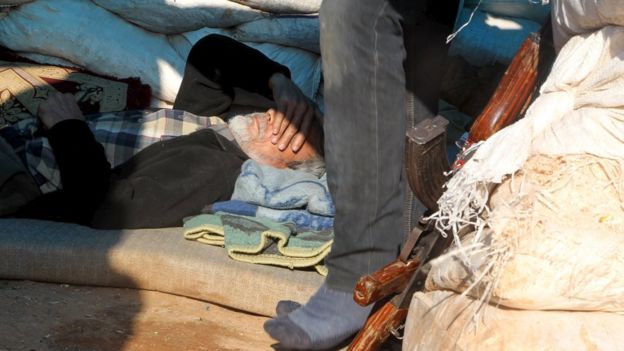
A Free Syria Army fighter rests in al-Tamorah, in the north of Aleppo province, on Sunday
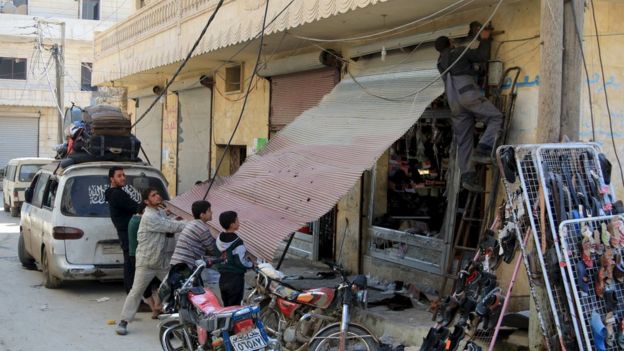
People work to fix a damaged shop in Darat Izza, Aleppo province, on Sunday
Russia has said that it is only targeting UN-designated jihadist terrorist organisations – including the so-called Islamic State (IS) and the al-Nusra Front, which is part of a major rebel alliance – in line with the terms of the cessation of hostilities.
‘Sealed off’
The relative calm on the ground around the capital Damascus allowed 10 aid lorries carrying blankets and hygiene supplies to entered the suburb of Muadhamiya on Monday afternoon, Syrian Arab Red Crescent officials said.
On Wednesday, the UN and its partners plan to deliver aid to the rebel-held towns of Madaya and Zabadani, in the mountains north-west of Damascus, and the government-controlled towns of Foah and Kefraya, in the northern province of Idlib.
Against the odds: analysis by Mark Lowen. BBC News, Gaziantep, near the Turkey/Syria border

A Syrian rebel fighter from the Failaq al-Rahman brigade rests inside a building in the Ghouta region near Damascus
This is now a crucial window of opportunity for the UN to get food and aid to the besieged. The truce has, in general, remained intact despite both the Western-backed opposition and regime sides complaining of dozens of violations over the weekend, including air strikes around Aleppo.
But it is unclear whether the target was the al-Qaeda-linked Nusra front, which would not constitute a ceasefire breach since it and the so-called Islamic State are not included in the deal.
A rebel spokesman talked of violations “here and there” but also of a situation much better than before. Moscow also complained of incidents but said on the whole, the ceasefire was being implemented.
That it has largely held for the weekend has defied expectations but there is still a lot of scepticism that it can continue for the full two weeks.
- What’s the difference between ‘ceasefire’ and ‘cessation’?
- Syria truce: Who’s in and who’s out?
- Syria conflict at ‘hinge’ moment
- How Putin is succeeding in Syria
They are also expected to attempt another air-drop over the eastern city of Deir al-Zour, where 200,000 people in government-held areas are under siege by IS.
High winds and parachute failures meant that pallets carrying 21 tonnes of food dropped last week either missed their target, went missing or were damaged.
The UN says more than 450,000 Syrians are trapped in 15 besieged towns and villages under siege, while 4.1 million others are living in hard-to-reach areas.
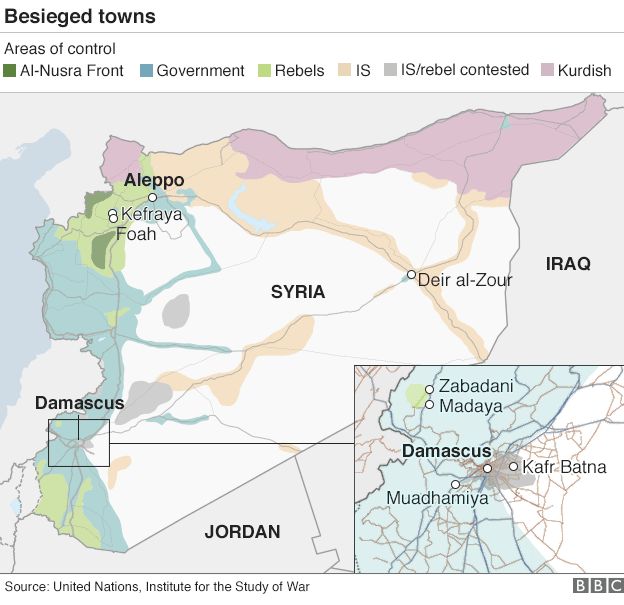
“Some of these people have not been receiving assistance for months or even up to a year in some cases, so it’s really, really important that we get food in and other kinds of assistance,” Greg Barrow of the World Food Programme told the BBC.
“We’re very concerned about the nutritional status of people living in those areas that have really been sealed off from the outside world,” he added.
‘Some incidents’
The UN’s secretary general meanwhile told reporters in Geneva that “by and large the cessation of hostilities is holding even though we have experienced some incidents”.
The taskforce monitoring the truce is “now trying to make sure that this does not spread any further and that this cessation of hostilities can continue”, he added.
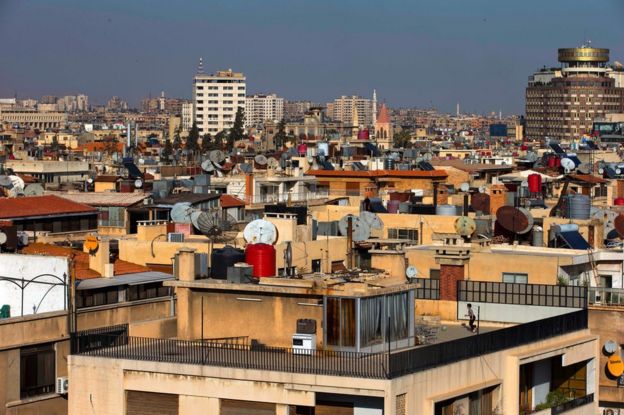
A boy plays football on a Damascus rooftop on Sunday
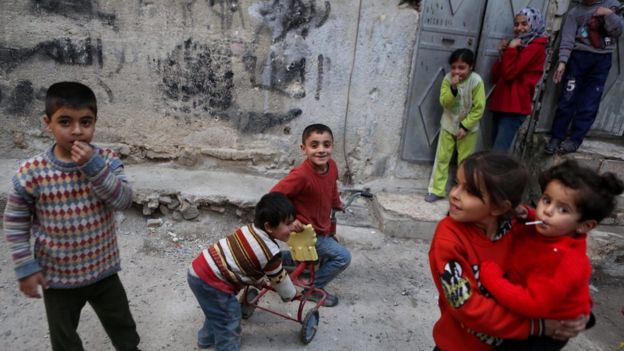
Children play in the rebel-held Tishreen district of Damascus
Mr Ban also confirmed receiving a letter from the main opposition umbrella group, the High Negotiations Committee, in which it urged the UN to help “specify the territory covered by the truce to prevent hostilities in the designated inclusion zones”.
The HNC’s general co-ordinator, Riad Hijab, wrote that since Saturday there had been seven barrel-bomb attacks, 24 cases of artillery shelling and five cases of ground attacks by government forces, resulting in a large number of civilian deaths. Russian warplanes had meanwhile carried out 26 air strikes on territory held by rebel forces abiding by the truce on Sunday alone, he added.
Mr Hijab warned that continued violations would jeopardise the resumption of UN-brokered talks aimed at finding a political solution to the five-year conflict.
State media said armed groups had fired dozens of mortar rounds at government forces in Latakia province on Sunday, though rebels in the area denied the reports.
Syria’s civil war
Why is there a war in Syria?
Anti-government protests developed into a civil war that, four years on, has ground to a stalemate, with the Assad government, Islamic State, an array of Syrian rebels and Kurdish fighters all holding territory.
What’s the human cost?
More than 250,000 Syrians have been killed and a million injured. Some 11 million others have been forced from their homes, of whom four million have fled abroad – including growing numbers who are making the dangerous journey to Europe.
How has the world reacted?
Iran, Russia and Lebanon’s Hezbollah movement are supporting the Alawite-led Assad government, while Turkey, Saudi Arabia and Qatar back the more moderate Sunni-dominated opposition, along with the US, UK and France. Hezbollah and Iran have pro-Assad forces on the ground, while Russia and a Western-led coalition are carrying out air strikes.
BBC
 Q FM Africa's Modern Radio
Q FM Africa's Modern Radio